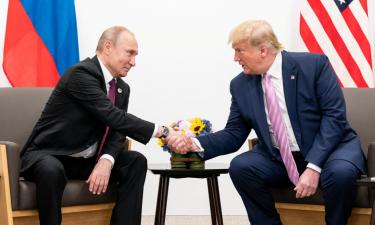Toilets Are a Big Part of Culture
Good toilets make good democracy too
Alexander Lipkov is a very interesting person to talk to. His knowledge of toilets is striking. He knows a lot about everything that has to do with toilets - who invented them and when, how Russian empress Ekaterina II preferred to do it, and why Joseph Stalin was shy of Russian lavatories. Alexander Lipkov has not kept his knowledge just to himself - he wrote a book about toilets, which immediately  became a bestseller.
became a bestseller.
Why did you decide to write a book about toilets?
It took me my whole life to write this book. The idea came from movie director Andron Konchalovsky. In the beginning of the 1990s, Konchalovsky decided to make a movie about a Russian toilet, and I was supposed to be a part of the project. However, the project was not realized due to lack of money. A toilet was a cultural phenomenon for Konchalovsky. Culture is not only Pushkin and Tolstoy, culture is a system of values that determines people’s daily behavior.
What were toilets like in ancient times?
The Ancient Greeks, for example, did not invent plumbing, despite their great spiritual achievements. They used chamber vases - pots. However, people had plumbing in ancient Egypt: archaeologists have unearthed escape canals that are 2,500 years old. In Ancient Rome, for example, closets were also used as such places, although only rich people could afford it. Others used stinking public toilets that were full of flies, especially in summer. Residents of Paris took their chamber pots and emptied them right out of their windows. Leonardo Da Vinci was shocked by the smell of Paris when he visited the city. He even designed a flushing toilet especially for the French king. However, his project remained just a project. Old Moscow was not better than Paris. Stinking streams used to flow along Moscow's central street, Tverskaya Street.
Modern Moscow environmentalists can celebrate the day of April 9th as a holiday. Peter the Great issued a decree on April 9th, 1699, about public cleanness in Moscow. The decree also stipulated punishments for throwing garbage and sewage out on the streets. However, the sanitary condition of the Russian capital did not improve anyway. Moscow suffered from a lot of epidemics, like other European cities did.
So when did the "toilet revolution" take place?
Asian cholera killed millions of Europeans in 1830. Horrible diseases made governments build plumbing systems. The Three Musketeers of the toilet appeared right around that time: George Jennings, Thomas Crapper and Thomas Twyford. Thomas Crapper became the most famous of them - the engineer invented the valve-and-siphon arrangement that made our modern toilet possible. I have seen so many portraits and bas-reliefs that depicted images of great outstanding people. However, I have never seen anything like that in honor of water closet inventors. Humanity is ungrateful.
When did toilet paper appear?
It appeared in the first century A.D. in China. A Chinese imperial family used to receive 15,000 sheets of toilet paper on a yearly basis in the Middle Ages. The rest of the world used sponges instead of paper.: you use it once and you can hand it over to someone else. Various nations used twigs, brushwood, dry grass, feathers, moss, and so on and so forth. I was totally wrong when I criticized my fellow countrymen for being inactive regarding toilet paper ideas. As it turned out, Russia has something to offer as well: Someone tried to patent toilet paper with politicians' images on it.
How did Soviet leaders treat the "toilet issue?"
They had different attitudes to it, but none of them were enthusiastic, though. In the 1930s Stalin was preoccupied with creating the image of the world's first socialist state. The Soviet leader invited a French writer to come and visit the USSR. The Frenchman was shocked by the dirt and design of Soviet toilets. Stalin prohibited publishing his book in the Soviet Union, and there was a reason for such a strict decision. The French writer unveiled a very big secret - the totalitarian regime was meant to humiliate people and put psychological pressure on them. Soviet toilets were part of that pressure and humiliation.
If the government changes the culture of a nation, will it manage to settle the "toilet issue"?
Politics does not determine culture. I totally agree with movie director Konchalovsky: if we make good toilets, we can make good democracy. I have recently seen an "elite" toilet in Moscow, near the Moscow Hotel. The price was very expensive - 25 rubles, but the service was perfect.
Do you think that toiletology as a science will find its place in society?
It is hard to say. I think that it might be useful for everyone, just for a broader outlook. No one has withdrawn the taboo from the toilet issue, and a certain moral ban is inside of every human being. Some people think that this subject is way too indelicate and disgraceful. Others feel that the taboo makes them want to talk about it, whether in the form of a joke or a real-life story. Yet, this is a rather serious subject. Konchalovsky was right when he said that we have to set up a Party of Clean Public Toilets. We will not be able to have democracy as long as we have dirty public toilets.
Alexander Lipkov was interviewed by German Vlasov
Arguments and Facts - Chelyabinsk
Subscribe to Pravda.Ru Telegram channel, Facebook, RSS!




